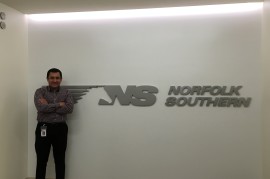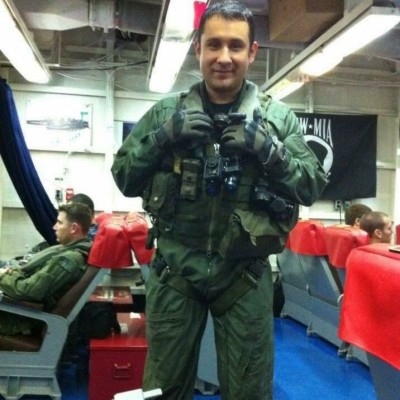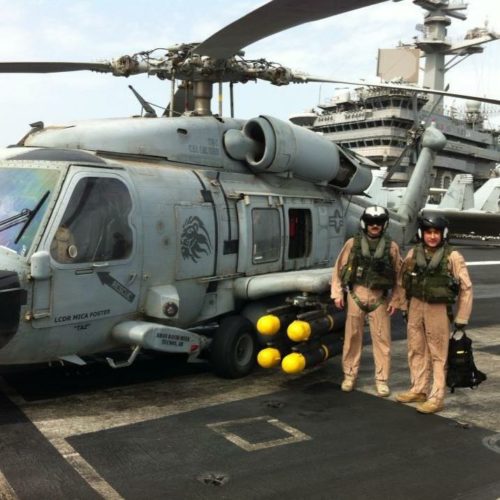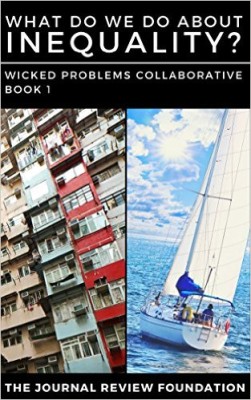When Marcos Hernandez began the EMBA program in September of 2013, he was an Executive Officer in the Navy with an eye on future opportunities in the military. Within a few months of graduating in May 2015 as a member of EMBA class 43, Marcos had exited the Navy and landed a management position for Norfolk Southern Corporation, one of the United States’ premier transportation companies. I asked Marcos, my teammate for the first half of EMBA 43, what happened.
What made you decide to do an EMBA?
In the Navy, I had the opportunity to manage large budgets, implement efficiencies, and lead and manage people, but I felt I lacked the true understanding of business and needed that knowledge to obtain a higher level of output. I felt that a business education would pay dividends in my job as a (then) military officer and also for a future in the private sector. I was not disappointed. I was immediately able to use concepts I learned in the program in my strat egic-level engagements with the United States Congress on transportation-related issues, question analytical decisions made by the federal government, and bring a new perspective on how we did business in the Department of Defense.
egic-level engagements with the United States Congress on transportation-related issues, question analytical decisions made by the federal government, and bring a new perspective on how we did business in the Department of Defense.
The EMBA also presented a world of opportunities to me in the private sector. Thousands of military personnel exit the service each year and compete for jobs in the private sector. I felt I needed a way to stand out among my peers. The prestige of a Washington University EMBA was an absolute catalyst for opening doors that might not have been open, even to a veteran.
What were your expectations for the EMBA program? Were your expectations met?
My expectations were absolutely exceeded! At the start of the program I had not made the decision to leave the Navy. I thought the education would be a great foundation for furthering my career in the service. As time went on my paradigm shifted on how I could best impact an organization, and I made the difficult decision of leaving active duty for the reserves at a very late stage in my career. To say that I was anxious is an understatement, but I knew I would be earning a world-renowned education. In addition, the support that my fellow classmates gave me throughout the program alleviated my fears and bolstered my confidence in my decision to enter the private sector.
The language of business is what has given me the confidence to step outside my comfort zone and to take calculated risks.
My current employer started the recruitment process prior to my official exodus from the service. Paramount to that recruitment was the EMBA. My final interview for my current position was conducted by the Vice President of our multi-billion dollar business unit. He specifically cited the reputation of the school along with my record of achievement the military as the reason I was being looked at for the position. Normally, my firm would not have placed an outside hire for the position I hold, as those positions are groomed internally and over the course of many years.
Most important is how I use the education in my position in Marketing Management:
- Negotiation is a key skill, and I use it every day. Understanding and employing the advanced concepts from that module of the EMBA has really helped in negotiating pricing on transportation solutions with our strategic partners.
- Macroeconomics has also been very important. The rail industry is a barometer for the greater economy.
- Understanding prognostication indexes, FOREX markets, appreciation of the US Dollar and its effect on commodities, plus the slowdown of China have been of utmost importance in understanding the second and third order effects on our industry and the greater economy as whole.
- Finally, financial accounting has been important in understanding key ratios pertinent to our industry as a whole. These are only a few of the concepts that have been important to developing strategies for increasing revenue, market share, and compensating for a fiscally challenging environment; concepts that I have been fortunate enough to learn from my teammates, professors, and the program.
How did the EMBA help you with your transition from military to civilian work?
One of my best memories from the program was a case study we did about synthetic blood and the decision about whether or not to launch the product. The case was laden with heavy financials, and I got to present our teams’ work and had to defend our decisions to a “board”. One of the people on the board was a classmate who is a CFO. He is a bright individual who could destroy you in a financial debate if you were not prepared.
 It takes a lot to rattle a Naval Aviator and I had to say I was nervous knowing I would have to debate him. At the end of that case study I thought to myself, “I’m more than capable of having a finance discussion with a CFO. Wow!”
It takes a lot to rattle a Naval Aviator and I had to say I was nervous knowing I would have to debate him. At the end of that case study I thought to myself, “I’m more than capable of having a finance discussion with a CFO. Wow!”
Moreover, my classmates were comprised of incredibly bright and talented people representing all walks of life and career sectors, and the fact that I can have a strategic-level discussion with any of them about business is incredible. The language of business is what has given me the confidence to step outside my comfort zone and to take calculated risks. With that confidence, I knew that I would be more than okay in the private sector. I can’t tell you how appreciative I am of my classmates and the program in my transition to what is the rest of my life.
I want to thank the professors and staff at Olin. They are a class act all the way around. I also want to thank my friends Bryce and Jamie Wolf, EMBA alum, who convinced me to take the leap and do the program. I am forever indebted to them as this was a life changing experience. Finally, both of my teams from the program: Rock stars in all dimensions.
Is an Executive MBA right for you? Find out using Olin’s EMBA Explorer.




 egic-level engagements with the United States Congress on transportation-related issues, question analytical decisions made by the federal government, and bring a new perspective on how we did business in the Department of Defense.
egic-level engagements with the United States Congress on transportation-related issues, question analytical decisions made by the federal government, and bring a new perspective on how we did business in the Department of Defense. It takes a lot to rattle a Naval Aviator and I had to say I was nervous knowing I would have to debate him. At the end of that case study I thought to myself, “I’m more than capable of having a finance discussion with a CFO. Wow!”
It takes a lot to rattle a Naval Aviator and I had to say I was nervous knowing I would have to debate him. At the end of that case study I thought to myself, “I’m more than capable of having a finance discussion with a CFO. Wow!”


 Chris’s recent LinkedIn post,
Chris’s recent LinkedIn post, 
